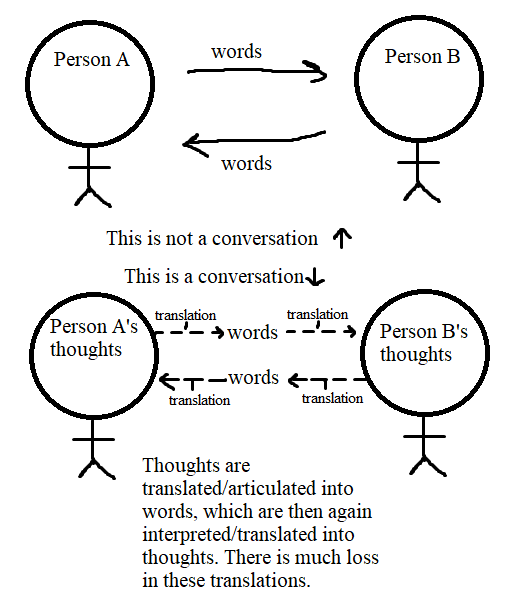“We really ought to free ourselves from the seduction of words!”
-Nietzsche, Beyond Good and Evil
Humans tend to develop and seek habits. These are mental shortcuts for action that reduce the amount of thought (and effort) that goes into a decision. This is prevalent in almost all areas of human action and decision, but I think that it is particularly interesting when it comes to language and conversation.
A great example is the awkward moment when a friend tells you ‘Happy Birthday!’ and you respond, ‘Thanks, you too!’ Why did I say ‘you too’ when it is not my friend’s birthday? Maybe it was out of habit, i.e. lack of thought. As a consequence, I said something I didn’t mean. In this example, it is okay and just a silly mistake, but I think there are much more serious consequences that result from this tendency to talk in habit rather than in thought.
In general, it seems conversations can absorb us into a rhythm that can overpower the genuine communication of two people’s individual thoughts. In an argument between two lovers, each gets absorbed into the rhythm of the argument and can end up saying things just to win the argument as if winning was an absolute goal. In doing so, each person forgets the reason for the existence of the argument, which is to communicate thoughts between the two for the purpose of each understanding the other, to continue and embrace the love of the relationship.
ASIDE: Actually, I don’t know if there ever can be an explicit reason for the conversation. I thought of writing that the purpose of the argument shouldn’t be just to win, that the purpose should be to overcome the argument and to continue being together as lovers. But really, sometimes the result of an argument should be to discontinue the relationship. This is again a place in which we would benefit from avoiding the solidification of a habit/goal, where in each individual case we should ask, ‘What am I trying to do here? Win an argument? Why do I want to win? Is it possible I’m wrong? Or that this issue is not as important to me as I’ve made it seem?’ ‘Do my means validate my ends? Does my end justify the means?’
We often get swept up in the “heat of the moment,” which is to say in the rhythm, the habit of a conversation. We ask ourselves, what words make sense to say next, which words follow rationally and adhere to the expectation of the conversation? We forget to ask ‘what do I think about what’s been said?’ We see a conversation as a discussion between two people with well-defined and static opinions, and each person should adhere to the expected dialogue and opinions of their respective roles. A democrat and a republican enter into a conversation about some policy issue, and neither person ever asks ‘what do I think about what’s been said?’ Instead, they ask ‘what does the party say about this issue? What is the democrat’s stance on this issue?’ The words each person says are merely theatrics, the conversation achieves nothing genuine for either individual participant because neither has genuinely participated in the conversation as an individual.*
On the surface, a conversation is an exchange of words between people. Is that all a conversation is? If two people spit out arbitrary words in grammatically correct structures, is that a conversation? It is impossible to tell without further investigation.
[At a college party]
J: “Hey, what’s your name?’
G: “Gavino. Yours?”
J: “James. What’s your major?”
G: “Math and Philosophy. Yours?”
J: “Math is so hard, I’m bad at it. I’m pre-med.”
G: “Cool…”
I have probably had this exchange of words over a hundred times, and almost none of them have felt like a conversation to me. Conversations are not just an exchange of words. In fact, I’ve had genuine conversations that were far more meaningful using only an exchange of glances. Conversations are more fundamentally an interaction of people’s thoughts, and most importantly, words are not thoughts.
What should come first in any interaction between people is a questioning of self, what do I think? What do I want to express? What am I trying to achieve through this expression of thought? What is the best way to express this thought? Amongst all these questions, the specific words used are merely a byproduct of the answer, and the words are always insufficient. They always fail to capture some aspect of the idea. The thoughts are always more than the words used to express them. In fact, words might not even be the best way to communicate a thought. It might be better to use a song, a melody, a picture, a dance, a glance or a gesture, or even silence. Words are tools. Like an artist who has some artistic vision and carefully chooses the material out of which he will manifest his vision, each word is a possible material out of which a thought can be manifested. Become an excellent craftsman with your tools, but recognize that the artist is not merely their tools!
The point is, however, that good communication is about thoughts. People sometimes are mistaken about this, they get into a habit of merely saying words, and they forget that words are tools to convey the meaning of a thought. Without thoughts, words are empty shells at best and misguided missiles at worst. Conversations should be had as a meeting of minds, using words as an imperfect bridge. I have a thought, I choose some words that somewhat capture (as best as I can) the idea. Symmetrically, I listen to words, knowing they are imperfect, and I try to surpass the literal words towards the person’s thoughts. ‘What are you trying to say? What do you mean? I know you don’t literally mean exactly these words, or do you?’
If we never talk in thoughts, and instead use only empty words to express things, we will end up saying things we don’t mean. In anger, I might mistakenly feel that ‘I hate you’ properly expresses my position, then I see the shocked face on my interlocutor and realize this is not what I meant to say; I don’t actually hate you, I was just angry. As silly as it sounds, maybe ‘I’m angry at you’ would’ve been more appropriate to say, but perhaps that wouldn’t have achieved the punch of impact that we wanted to convey. Words are rarely perfect. The thought I was trying to convey was fundamentally not a word or phrase, it was a mixture of feelings, relations, and some indescribable otherness, and any finite choice of words pathetically falls short of a perfect description.
This means that we will always somehow say things we don’t mean, and mean things we don’t say. But by recognizing this, and the role of thought in the selection of words and communication, by pushing ourselves to first think for ourselves what we feel and what we think is correct, and then selecting the best available words, we can minimize the number of errors in communication.
The phrase “lost in translation” is good here. It might be easy to forget that even when two people are speaking the same verbal language, there is still a lot of translation going on.
Words are not thoughts! Conversations are not words! Stop having silly exchanges of words— think, and then choose words!
“One no longer loves one’s insight enough once one communicates it.”
-Nietzsche, BGE
post-script: Interesting to consider the personal development of language. As one gets more expertise with words (vocabulary), one becomes a master craftsman of [words] → [thoughts]. When a person is less experienced with words, they have to stick closer to ready-made presets and talk in traditional “common phrases” which inevitably are less attuned to the particular individual thought. The word ‘articulate’ succinctly captures this idea. Articulation is a good skill.
*: Why do politicians care about acting for their constituency? For re-election? To make more money? Power? This seems like the wrong system. It creates precisely this mode of action which never checks itself and asks, is this what I want? Each ‘representative’ never asks themself why they were elected instead of another figurehead for the same causes. Or alternatively, we as citizens elect ideas and policies, not humans, we only look for the person who best acts as a figurehead, a flag-bearer, for the cause we aim at. So why do we ever expect our politicians to be thinking people? They were elected to represent an idea and so they are essentially a blind force running full speed in the direction of a singular set of ideas, or as a servant of either a blue or red party. We would benefit from redefining the purpose and role of elected officials. Their only role should be to be a thinking person who knows their community and understands, from individual experience, the needs of their own region. They should make thinking decisions not based on an abstract ‘general consensus’ or ‘party policy’ but on their individual and concrete assessment of the good of their region. In short, our representatives should think for themselves on policy issues, and decide based on their individual interpretation in the context of their region, NOT an individual interpretation of the general, abstract will of a population, which is never anything more than an unsynthesized collection of individual and concrete interpretations.





Congrats Gavino on making us reflect for more than a moment!
For me as an Educator, words are something to consider with all your senses, just because they are a "powerful" tool. You can actually "make" or "break" a student with "just" words, because we fail to realize that thoughts and feelings are behind those words, and at the same time, those words will provoke thoughts and feelings in return.
This is why I like to be very careful, and when I speak, I always try to say something "nice", something "uplifting", something "positive". Me parents always taught me that if I was to speak, I had better have good things to say, otherwise, I should not say anything.
Today with my students, I teach them to "kill others with kindness", so that if they are out at recess and someone says something to "try" to make them feel bad/sad, they should "get back" at them with something nice they say. An example is, a student mentions that some other student told him how ugly his/her shoes are. That students "gets back" at the offender with a compliment such as "Hey, I really like your T-shirt!", and right after, they should turn around and walk the other way to not engage in further conversation that might lead to bitter "come-backs". This formula is working quite well, I get marvelous stories every day!
Finally, ask Carla, Sebastian or Daniel about "filling buckets", and they will have some funny memories to share!!!
Empathy, Patience, Love, and the willingness to listen and forgive :)
Felicidades Gavino! Sigue escribiendo!
Con cariño,
Carol Barry
Good stuff Gav